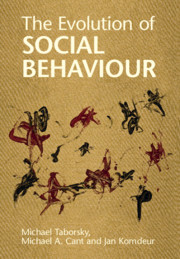4 - Cooperation
Published online by Cambridge University Press: 30 July 2021
Summary
In the previous chapters we have discussed how to succeed in obtaining resources by attempting to be quicker (race) or stronger (fight) than competitors. The third principle tactic to cope with competition for resources is to share them, which involves conceding a quota to competitors. This may prove to be a better choice than either racing or fighting, particularly if these tactics are too costly or unprofitable because of limited competitiveness, or due to concordance of fitness interests (Frank 2003; Taborsky et al. 2016). Sharing can also be favoured if coordinating or cooperating with other individuals increases the value of a resource, or helps to produce resources (Clark & Mangel 1986; Garfinkel & Skaperdas 2007; e.g. in cooperative hunting: Packer & Ruttan 1988; Dumke et al. 2018). Cooperation often guarantees the most efficient use of resources, because of synergistic effects (Maynard Smith 1982b; Queller 1985; Hauert et al. 2006; Gore et al. 2009; Cornforth et al. 2012; Van Cleve & Akcay 2014; Corning & Szathmary 2015). For instance, if several individuals coordinate to capture a prey that is normally difficult or risky to hunt on their own, each individual predator may gain more food at lower cost. Similarly, raising offspring in a group may allow individuals to specialize in different tasks, such as tending young, warding off predators and supplying resources, which enhances the efficiency of offspring care.
- Type
- Chapter
- Information
- The Evolution of Social Behaviour , pp. 136 - 262Publisher: Cambridge University PressPrint publication year: 2021



